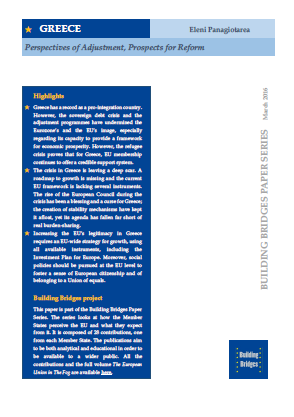Greece: Perspectives of Adjustment, Prospects for Reform

Greece has a record as a pro-integration country. Yet, the sovereign debt crisis and the adjustment programmes have sapped the Eurozone’s and the EU’s image, especially regarding its capacity to provide a framework for economic prosperity. Still, the refugee crisis proves that EU membership continues to offer a credible support system within which it can expect economic aid, organisational backing and the protection of its borders.
The crisis is leaving a deep scar. A roadmap to growth is missing and the EU framework is lacking several instruments to support the economy. The rise of the European Council has been a blessing and a curse for Greece; the creation of stability mechanisms have kept it afloat, yet its agenda has fallen far short of real burden-sharing.
Increasing the EU’s legitimacy requires an EUwide strategy for growth, using all available instruments, such as the Investment Plan for Europe. Besides, social policies should be pursued at the EU level to foster a sense of European citizenship and of belonging to a Union of equals.
This publication is part of the "Building Bridges Paper Series". For more information about this project, click here.

Available in:
Regions and themes
Share
Download the full analysis
This page contains only a summary of our work. If you would like to have access to all the information from our research on the subject, you can download the full version in PDF format.
Greece: Perspectives of Adjustment, Prospects for Reform
Related centers and programs
Discover our other research centers and programsFind out more
Discover all our analysesThe U.S. Policy Toward Taiwan Beyond Donald Trump: Mapping the American Stakeholders of U.S.-Taiwan Relations
Donald Trump’s return to the White House reintroduced acute uncertainty into the security commitment of the United States (U.S.) to Taiwan. Unlike President Joe Biden, who repeatedly stated the determination to defend Taiwan, President Trump refrains from commenting on the hypothetical U.S. response in the context of a cross-Strait crisis.

China’s Strategy Toward Pacific Island countries: Countering Taiwan and Western Influence
Over the past decade, China has deployed a diplomatic strategy toward the Pacific Island Countries (PICs). This strategy pursues two main objectives: countering Taiwan's diplomatic influence in the region and countering the influence of liberal democracies in what Beijing refers to as the "Global South."

Opening up the G7 to South Korea to Address Contemporary Global Challenges
The G7’s global influence has diminished as powers like China reshape international governance through initiatives such as BRICS and the Shanghai Cooperation Organisation (SCO). With the G7 now representing just 10 per cent of the world’s population and 28 per cent of global GDP, its relevance is increasingly questioned.
Expanding SPDMM as a pivotal institution in the Pacific – A French perspective
The South Pacific Defence Ministers’ Meeting (SPDMM) is the only forum that brings together defense ministers from the wider South Pacific — including Chile, which is hosting it for the first time. This heterogeneous group of countries with varying resources, capacities, and interests — Australia, Chile, Fiji, France, New Zealand, Papua New Guinea (PNG), and Tonga — are united by their shared determination to strengthen cooperation on maritime security and humanitarian assistance and disaster relief (HADR) activities.







